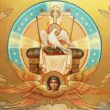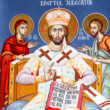17 This news about Jesus spread throughout Judea and the surrounding country.
18 John’s disciples told him about all these things. Calling two of them, 19 he sent them to the Lord to ask, “Are you the one who is to come, or should we expect someone else?”
20 When the men came to Jesus, they said, “John the Baptist sent us to you to ask, ‘Are you the one who is to come, or should we expect someone else?’”
21 At that very time Jesus cured many who had diseases, sicknesses and evil spirits, and gave sight to many who were blind. 22 So he replied to the messengers, “Go back and report to John what you have seen and heard: The blind receive sight, the lame walk, those who have leprosy[a] are cleansed, the deaf hear, the dead are raised, and the good news is proclaimed to the poor. 23 Blessed is anyone who does not stumble on account of me.”
24 After John’s messengers left, Jesus began to speak to the crowd about John: “What did you go out into the wilderness to see? A reed swayed by the wind? 25 If not, what did you go out to see? A man dressed in fine clothes? No, those who wear expensive clothes and indulge in luxury are in palaces. 26 But what did you go out to see? A prophet? Yes, I tell you, and more than a prophet. 27 This is the one about whom it is written:
“‘I will send my messenger ahead of you,
who will prepare your way before you.’[b]
28 I tell you, among those born of women there is no one greater than John; yet the one who is least in the kingdom of God is greater than he.”
29 (All the people, even the tax collectors, when they heard Jesus’ words, acknowledged that God’s way was right, because they had been baptized by John. 30 But the Pharisees and the experts in the law rejected God’s purpose for themselves, because they had not been baptized by John.)
How we acquire virtue
Saint Maximus the Confessor, Epistles, second part, the Dispute of Saint Maximus with Pyrhus, 25, in Church Fathers and Writers (1990), vol. 81, p. 333
„Pyrhus: If the natural ones don`t come from ascesis but from creation and the virtue is natural how do we gain the virtues through toil and ascetic struggle while they aref natural?
Maximus: The ascetical struggle and toil which follow were added in those who love virtue only for the removal of deceit which pervades our soul through senses not for introducing the virtues as if they were something new from outside as they are from within ourselves as they said from Creation. That is why immediately after the deceit is removed the soul shows the brightness of virtue. Who is not mindless is wise; who is fearless is brave, who is not unrestrained is restrained, who is not unjust is just. The natural sense is wisdom; judgment has in itself righteousness; the temper has in itself courage; desire has in itself temperance. Therefore through the removal of those against nature those belonging to nature are settled and shine as by removing rust iron irradiates its natural shiny luster and clarity.
Source: http://ziarullumina.ro






